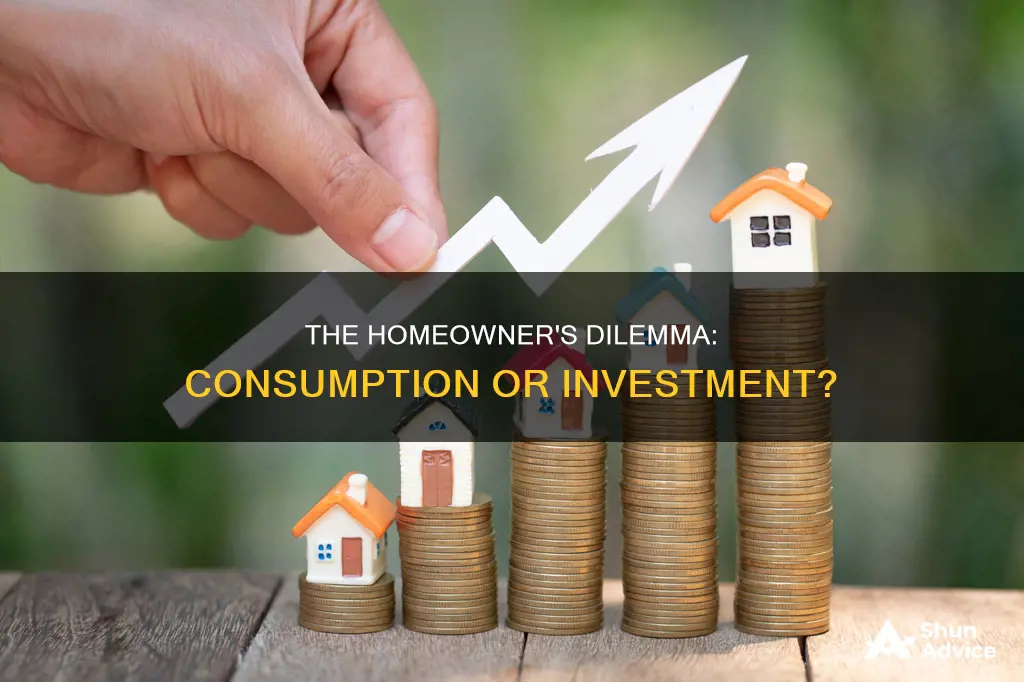
Buying a house is often seen as a key milestone in a person's life, with many considering it a crucial part of the American Dream. However, the question of whether it is a consumption or an investment is a complex one. In everyday terms, an investment is something you do to get a future gain, while consumption is buying something for short-term use. In economic terms, investment is spending on capital equipment, inventory, and structures, while consumption is spending on final goods by households, except for new homes.
When considering a house as an investment or consumption, it is essential to distinguish between the purchase of an existing home and the construction of a new one. The purchase of an existing home is generally not considered an investment in economic terms because it involves the exchange of an existing asset and does not contribute to new production. On the other hand, the construction of a new home is considered an investment because it involves the creation of a new capital good.
From a financial perspective, buying a house can be a good investment due to factors like appreciation and equity building. However, it is important to consider the costs associated with homeownership, such as property taxes, maintenance, and insurance, which can offset the potential gains. Additionally, the dynamics of the real estate market, including housing prices and mortgage interest rates, should be considered when evaluating the investment potential of buying a house.
| Characteristics | Values |
|---|---|
| Considered an investment | When it is a new house |
| Considered consumption | When it is not a new house |
| Considered a good investment | When it appreciates in value over time |
| Considered a good investment | When it is used as a "forced savings" asset |
| Considered a good investment | When it is used to build equity |
| Considered a good investment | When it is used to generate rental income |
| Considered a bad investment | When it has high acquisition costs |
| Considered a bad investment | When there is a lack of appreciation |
| Considered a bad investment | When there are high homeownership costs |
What You'll Learn

A house is a capital good
The purchase of a house may be regarded as an investment because it is the purchase of a capital good. This is true even if the house is not being used for production in the conventional sense, as in the case of a household buying a home to live in rather than to rent out. In national income accounting, the purchase of a new house is treated as an investment, with the rationale being that the homeowner is receiving a benefit in the form of housing services that they would otherwise have to pay for (e.g. by renting).
However, it is important to note that definitions and lines in economics can be fuzzy, and there may be grey areas. For example, the full purchase price of a home is not considered an investment, only the structure is. Additionally, consumer durables that come with the home, such as a refrigerator, are not counted as investment unless the home is being rented out.
The treatment of a house as a capital good and the purchase of a house as an investment also have implications for economic measurements such as Gross Domestic Product (GDP). If a house is counted as an investment, then it contributes to GDP. However, if a house is sold and resold, the appreciation of the house (the increase in its value) does not contribute to GDP because it is not considered new growth.
While buying a house can be considered an investment, it may not always be a good one. A house may not appreciate in value, and there may be high acquisition costs, maintenance expenses, and other associated costs such as property taxes and insurance. These costs can outweigh any potential gains from appreciation. Therefore, it is important to consider the financial circumstances and goals when deciding whether to buy a house.
The Debt-Investment Dilemma: Navigating the Path to Financial Freedom
You may want to see also

Appreciation is not guaranteed
The most common factors that impact home appreciation are the housing market, location, interest rates, and home improvements. Supply and demand play a critical role in appreciation. In a seller's market, home appreciation will increase, while in a buyer's market, home values may decrease or plateau. Location also affects appreciation, as desirable neighbourhoods with popular amenities tend to have higher demand and appreciation. Interest rate trends affect appreciation by influencing prospective home buyers' decisions. Low-interest rates typically motivate buyers to purchase sooner, which can increase appreciation.
Home improvements and renovations can also positively impact home value over time. However, it's important to note that appreciation doesn't happen in isolation. Homes are constantly depreciating unless they are well-maintained or renovated. Additionally, appreciation rates can fluctuate due to changes in the housing market, so the current rate may not reflect future value.
While it's challenging to predict how much a home will appreciate, homeowners can take proactive steps to improve their property's value. Regular maintenance, renovations, and upgrades can help maintain or increase a home's value. Staying informed about local real estate market trends can also help homeowners make strategic improvements that align with market demands.
In conclusion, while home appreciation is desirable, it is not guaranteed. A combination of factors, some within and others beyond a homeowner's control, influences whether a home's value increases or decreases over time. Homeowners can take proactive measures to enhance their property's appreciation potential, but they should also be aware that appreciation rates can fluctuate and are subject to various economic and market forces.
ESG Investing: Who's On Board?
You may want to see also

Homeownership costs can increase
- Maintenance and Upkeep: One of the biggest costs of owning a home is maintenance and routine upkeep. This includes obvious tasks such as lawn care, painting, and cleaning, but also hidden costs like clearing rain gutters, replacing smoke alarm batteries, and roof repairs or replacements. Roof maintenance and replacement can be particularly expensive, costing thousands of dollars depending on the size and slope of the roof, and the materials used.
- Systems and Repairs: Maintaining and repairing systems like HVAC, wiring, and plumbing can also add to the cost of homeownership. Servicing an air conditioning unit can cost up to $200, and hiring a technician for repairs may cost $50 to $150 per hour. Wiring projects and plumbing issues can also be costly, with average costs of about $2,000 and $600 to $1,600 respectively.
- Homeowners Association (HOA) Fees: If you live in an area with an HOA, you may be required to pay HOA fees, which can amount to thousands of dollars per year. These fees may include some maintenance services, or you may need to pay extra for those services.
- Homeowners Insurance: This is another cost that homeowners need to factor into their budget. Premiums can vary widely, and it's important to shop around and compare offers. Increasing your deductible can help reduce the cost of premiums.
- Property Taxes: Depending on your location, you may need to pay property taxes, which are determined by the effective tax rate and the value of your home. These taxes may be paid monthly, annually, or twice a year.
- Hidden Costs: Overall, the hidden costs of homeownership can add up to a significant amount. According to a Bankrate study, the average annual cost of owning and maintaining a single-family home in the US is over $18,000, a 26% increase compared to four years ago. This includes expenses such as property taxes, homeowners insurance, maintenance and repair costs, energy bills, and internet and cable services.
- Inflation: Homeownership costs can also increase due to inflation. In recent years, home prices have increased significantly, and consumers are dealing with the after-effects of pandemic-driven inflation, which has led to higher prices for goods and services.
It is important for prospective homeowners to carefully consider these potential costs and create a budget that includes both regular expenses and emergency funds for unexpected repairs or maintenance.
Strategic Retirement: Smart Ways to Invest a $500,000 Nest Egg at 63
You may want to see also

Renting offers more flexibility
When it comes to the decision to rent or buy a home, there are several trade-offs to consider. One of the biggest benefits of renting is the flexibility and freedom it offers.
Renting gives you the freedom to move when and as often as you like. Even if you've signed a full-year lease and decide to move out sooner, your options are much less complicated than those involved with homeownership. Breaking a lease is a far cheaper and less consequential situation to deal with than not being able to sell a property.
Renting provides you with the flexibility to take that amazing new career opportunity, travel, or move towns/cities. It allows you to take advantage of new opportunities without being locked down to a 30-year mortgage.
Renting also gives you more time and money to spend on things you love. You don't have to worry about repair jobs or renovations, and you can avoid unnecessary fees.
While homeowners have the benefit of stability, with the ability to stay in their homes as long as they desire, renters have the flexibility to get up and go at a moment's notice.
Invest Wisely, Retire Early: A Guide to Financial Freedom
You may want to see also

Buying a house is a good investment
There are many differing opinions on whether buying a house is a good investment or not. However, in this answer, I will focus on the reasons why buying a house is a good investment.
Firstly, it is important to note that 78% of Americans view homeownership as part of the "American Dream", according to a Bankrate survey. While this dream is becoming increasingly unaffordable due to high housing prices and mortgage rates, it is still possible to make it a reality with careful financial planning.
One of the main reasons why buying a house is considered a good investment is the potential for appreciation, which is the increase in the home's value over time. According to data from the US Census Bureau, the average sale price of homes in the US increased significantly from $331,400 in the first quarter of 2014 to $513,100 in the same quarter of 2024. This appreciation can build wealth for homeowners, especially if they decide to sell their property in the future.
Additionally, purchasing a home can be a better investment than renting, as renting involves paying money directly to the landlord without building any home equity. On the other hand, buying a home allows individuals to build equity, which can be used to finance other investments or borrow against in the future.
Another advantage of owning a home is the potential to generate rental income. Individuals can rent out a portion of their home or purchase properties specifically for this purpose, such as duplexes or apartments with separate living spaces. This can help offset mortgage payments and other ownership costs.
Furthermore, owning a home provides individuals with a place to live, which is a basic necessity. While other investments, such as stocks or bonds, may offer potential financial gains, they do not provide the same tangible benefit of having a roof over one's head.
Lastly, buying a home can be considered a type of "forced savings" as it requires individuals to make regular mortgage payments, which build equity in their asset. This disciplined approach to saving and investing can be beneficial for individuals who might otherwise struggle to save consistently.
In conclusion, while there are arguments against buying a house as an investment, there are also strong reasons why it can be a wise financial decision. It is important for individuals to carefully consider their financial circumstances, goals, and the dynamics of the real estate market before making this significant decision.
Investing for Freedom: Early Retirement Strategies
You may want to see also
Frequently asked questions
Buying a new house is considered an investment in the economic sense because it involves spending on capital equipment. However, in everyday terms, it can be viewed as consumption since the house is being used up over time.
Buying a new house can be a good investment as it often appreciates over time, building equity and wealth for the homeowner. Additionally, it can provide a steady income stream if a portion of the house is rented out.
The high acquisition costs, including property taxes, maintenance, and insurance, can outweigh the potential appreciation in value. Buying a house also reduces liquidity and flexibility compared to renting.
Investing in real estate may provide more stable returns compared to the stock market, but it may not offer the same level of long-term growth potential. It's important to consider your financial circumstances, risk tolerance, and short-term and long-term goals when deciding between different investment options.







